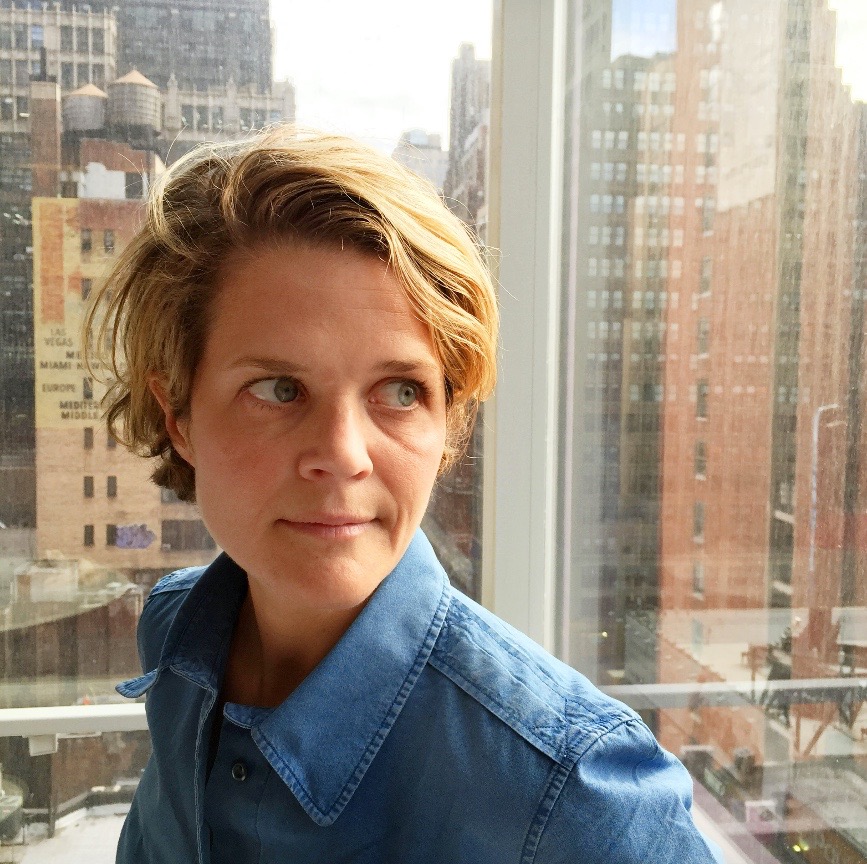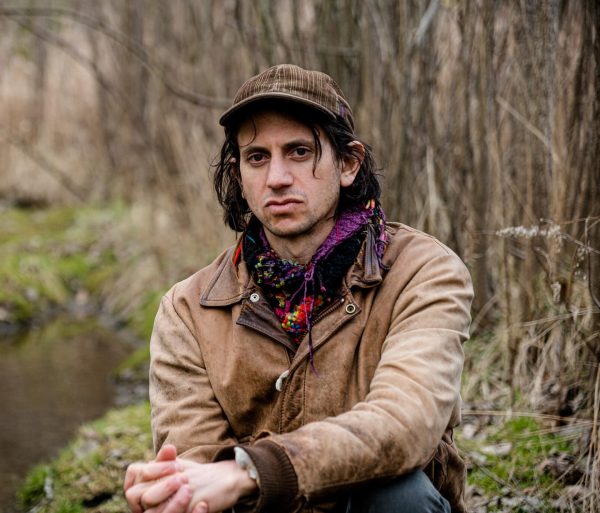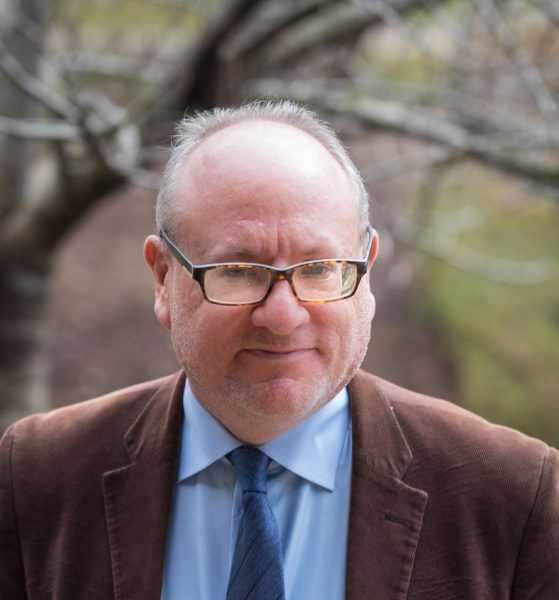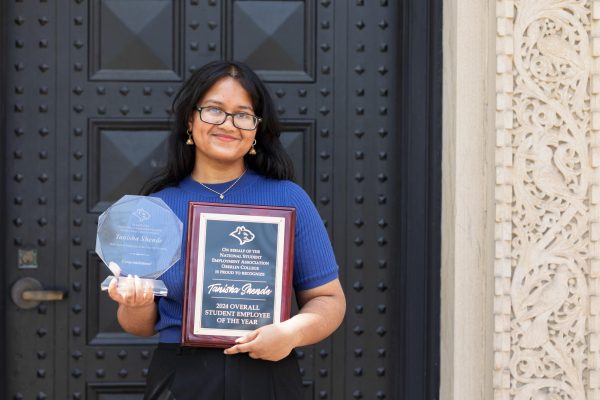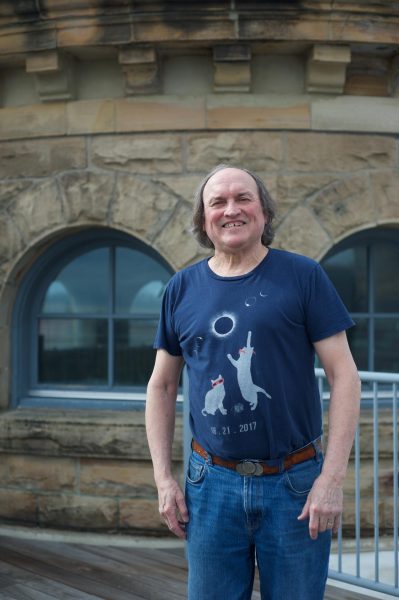Eliza Griswold, Journalist
Eliza Griswold
Award-winning journalist and poet Eliza Griswold visited Oberlin Sunday, Sept. 23 to discuss her book Amity and Prosperity: One Family and the Fracturing of America, which focuses on the impact of fracking on a small community in southwestern Pennsylvania. In addition to her work on fracking, Griswold has reported from the field on the “War on Terror,” written about the Christian-Muslim divide, and published a book of poetry. She spoke at Oberlin at a time when northeast Ohio — similar to the Pennsylvania communities in her recent book — is grappling with the impacts of fracking on public health, family life, and the economy.
This interview has been edited for length and clarity.
First off, I was hoping you could talk a little bit about your work with fracking and how you came to be doing it.
Sure. I came to it, oddly enough, by way of northern Nigeria. I was in Nigeria years ago when a bridge collapsed, and I had to get over a river and I did what you do as a journalist, which is use an old empty oil barrel. It was a couple weeks after the bridge in Minneapolis had collapsed, [Interstate-35 West], killing 13 people.
There was something about that. Really, it was about a call to come back to the United States and look at our failing systems. Look at our lifeline systems, our roads, our bridges, and how they’re not working anymore. And it was in the course of doing that kind of reporting in southwestern Pennsylvania that I came to learn about fracking and its impact on local communities, and it was through that I began working on the book.
Can you talk a little bit about what those impacts are on the communities you have seen?
We talk a lot about — or we’re familiar with — environmental impacts, but there’s a much more holistic sense of those impacts that has to do with social impacts as well as economic. We see different crises coming out of areas that have been struck by what we call the resource curse, which is how [the] places richest with natural resources remain some of the poorest. That has to do with the long-term cost of boom-and-bust cycles on both education and employment over decades and over centuries.
Over the course of your time covering fracking in Pennsylvania, I’m wondering if there is a specific experience, or time, or series of experiences that stand out as being particularly profound and particularly representative of why this is so important to you.
Yeah, there’s a boy at the heart of this story named Harley Haney, who was 14 when the story began. He wanted to be a veterinarian and [was a] smart kid, liked school. He got a series of illnesses that his family believed were related to the fracking going on next door and the waste pond in particular. He has gone from that boy who was so hopeful about being the first boy in his family to go to college to, you know, successive hard knocks that have lacallnded him working on the pipeline, which is the very industry that sickened him. And he lived in his mother’s basement for much of his life, severely, severely depressed and angry.
There’s a story by Ursula K. Le Guin about the road to Omelas which is about the ones who walked away from Omelas. It’s a long story that plays out with a child who’s paying for the cost of all of us by living in a basement and being chained to a wall — his suffering is the cost that the whole town pays for its progress and its success. There’s a parallel to Harley’s life there that really gave me pause and made me think much more about my relationship to energy and what I consume and why I consume it and who pays that cost, which is rural Americans.
So there’s a lot of this going on in Northeast Ohio as well, right where we are, and I’m wondering if you can speak to that. I know that your reporting has been focused on Pennsylvania but [I’m curious] if you know the scene of what it’s like in Northeast Ohio when it comes to fracking.
I know some of the challenges that Ohio is facing, in particular, are related to injection wells. The geology in Pennsylvania doesn’t allow for the waste to be pumped into the earth, the way that it is here. So much of the waste in Pennsylvania, in addition to Ohio’s own waste, is trucked to Ohio and injected into the earth, and already we know it causes earthquakes. So that’s just one of the many crises that Ohioans are dealing with in paying for the profits of industry.
What can we as residents in northeast Ohio do about it?
You can realize that energy is actually shockingly local. Everything from microgrids to breaking pressure, are in your community and looking into what the community’s investment portfolio looks like, in terms of energy. What kind of energy do you guys use, composting. All of these aspects can actually make a difference. I know at Oberlin, fighting pipelines has been very much something that students have been involved in. Pipelines are federal most of the time — infrastructure is federal — which makes it an impossible fight, not one that’s not honorable to wage, but there are other ways to get off the grid, to not rely on the fossil fuels that are so problematic.
To move to that national scale for a little bit, I think climate change and environmental issues are often framed as partisan issues. …So I’m curious on a national level what the partisan breakdown is in reality between Republicans and Democrats when it comes to these issues of fracking?
There wouldn’t be a national thumbnail like that I don’t think, you know, there are many Democrats — including the governor of Pennsylvania, Tom Wolf — who [are] supportive of the oil and gas industry. It has much more to do with what resource bases are and contingencies are state-by-state. … I mean in some sense, you think of climate and environment as a left/right issue, but when it really gets into the nitty-gritty, you’ll see that Democrats in much of the country where natural gas is part of their industrial revenue stream are also pro-natural gas.
So for these communities that have been impacted by fracking, what is the long-term outlook? What is the sustainability of those communities moving forward?
Well, it’s pushed a huge awakening about energy in general, and in some of these rural places it really helps people thinking of moving to renewables on their farms and in their small communities because they want no part of this. Also [renewables are] economically viable. So I think what we’ve seen is that this has just sped up a huge awareness for some people who have had negative experiences of oil and gas. It’s sped up their sense of how doomed fossil fuels are and what their actual impacts are in communities and to families.
One thing that I was really interested to learn about you is that you’re also a poet! I’m curious how you see that playing into your journalism and specifically this work that you’ve done in Pennsylvania?
So, you know, both being a reporter and being a poet have in common paying attention. The more you pay attention, the better the work’s gonna be, and I often say in reporting classes [that] no piece of writing can be better than the reporting that supports it. And I think that’s true of poetry as well. I really gravitate towards poetry that’s attempting to locate itself in truth, big-T truth, which requires accurate paying attention to both an interior and an exterior landscape.
A lot of this seems so bleak…and so I’m curious if you have hope for the future, what we’re doing to the land and to communities, and if you do, where it comes from?
You know, I have less hope for America and more hope for places in the world that are going to technologically bypass the need for fossil fuels. I think in particular, you know, ingenuity in some African countries, where using solar [energy], using different wind [energies], solar really is allowing people to almost jump the technology, so the [same] way that there were never any landlines phones in a lot of Africa, because they jumped straight to mobile. The fossil fuel industry that so dominates our life and that of China and India, there are places that aren’t yet on that particular development model and can’t be and won’t be, where renewables will make good economic sense.
Renewables make good economic sense already — one of the reasons they’re so fast-growing … has nothing to do with environmentalists; it has to do with the market. That’s probably the most hopeful thing that I saw; the growth and viability of renewables is a practical truth, and so therefore the market may save us when it comes to renewables.
What is next for you after this book?
I’ve been writing quite a bit. As a journalist, I have mostly written about religion, and I am coming back to writing about religion and how religion in America has become politicized and what people are doing to reclaim it.


